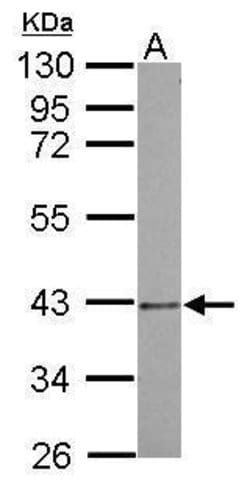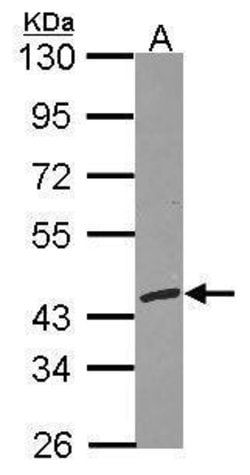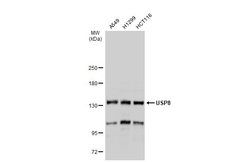PSMD7 Polyclonal Antibody, Invitrogen™
Manufacturer: Thermo Scientific
Select a Size
| Pack Size | SKU | Availability | Price |
|---|---|---|---|
| Each of 1 | PIPA527941-Each-of-1 | In Stock | ₹ 48,193.50 |
PIPA527941 - Each of 1
In Stock
Quantity
1
Base Price: ₹ 48,193.50
GST (18%): ₹ 8,674.83
Total Price: ₹ 56,868.33
Antigen
PSMD7
Classification
Polyclonal
Conjugate
Unconjugated
Gene
Psmd7
Gene Alias
26S proteasome non-ATPase regulatory subunit 7; 26S proteasome non-ATPase regulatory subunit 7-like protein; 26S proteasome regulatory subunit rpn8; 26S proteasome regulatory subunit S12; AW107203; Moloney leukemia virus-34 proviral integration; Mov34; Mov-34; Mov34 homolog; Mov34 protein; Mov34 protein homolog; MOV34L; P40; proteasome (prosome, macropain) 26S subunit, non-ATPase, 7; proteasome (prosome, macropain) 26S subunit, non-ATPase, 7 (Mov34 homolog); proteasome 26S non-ATPase subunit 7; proteasome 26S subunit, non-ATPase 7; proteasome subunit p40; Psmd7; Rpn8; S12; wu:fi03c01; zgc:55284
Host Species
Rabbit
Purification Method
Antigen affinity chromatography
Regulatory Status
RUO
Gene ID (Entrez)
5713
Content And Storage
Store at 4°C short term. For long term storage, store at -20°C, avoiding freeze/thaw cycles.
Form
Liquid
Applications
Immunocytochemistry, Western Blot
Concentration
0.78 mg/mL
Formulation
0.1M tris glycine with 20% glycerol and 0.01% thimerosal; pH 7
Gene Accession No.
P51665
Gene Symbols
Psmd7
Immunogen
Recombinant fragment corresponding to a region within amino acids 47 and 324 of Human PSMD7
Quantity
100 μL
Primary or Secondary
Primary
Target Species
Human
Product Type
Antibody
Isotype
IgG
Description
- Recommended positive controls: A549, HeLa, HepG2, HCT116
- Predicted reactivity: Mouse (98%), Rat (97%), Zebrafish (97%), Xenopus laevis (96%), Rhesus Monkey (99%), Bovine (98%)
- Store product as a concentrated solution
- Centrifuge briefly prior to opening the vial
- Proteolytic degradation is critical to the maintenance of appropriate levels of short-lived and regulatory proteins as important and diverse as those involved in cellular metabolism, heat shock and stress response, antigen presentation, modulation of cell surface receptors and ion channels, cell cycle regulation, transcription, and signaling factors
- The ubiquitin-proteasome pathway deconstructs most proteins in the eukaryotic cell cytosol and nucleus
- Others are degraded via the vacuolar pathway which includes endosomes, lysosomes, and the endoplasmic reticulum
- The 26S proteasome is an ATP-dependent, multisubunit (approximately 31), barrel-shaped molecular machine with an apparent molecular weight of approximately 2.5 MDa
- It consists of a 20S proteolytic core complex which is crowned at one or both ends by 19S regulatory subunit complexes
- The 19S regulatory subunits recognize ubiquitinated proteins and play an essential role in unfolding and translocating targets into the lumen of the 20S subunit
- An enzymatic cascade is responsible for the attachment of multiple ubiquitin molecules to lysine residues of proteins targeted for degradation
- Several genetic diseases are associated with defects in the ubiquitin-proteasome pathway
- Some examples of affected proteins include those linked to cystic fibrosis, Angelman's syndrome, and Liddle syndrome.



